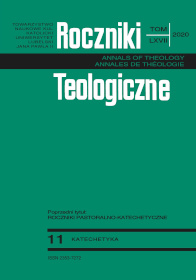Personalistic Concept of Moral Formation
Abstract
Personalistic moral formation is universal because it refers to the truth about man as a person. It leads first to Christian values, but in principle it refers to something fundamental, i.e., to the inner capacities specific to every human being, believer or not. This is why the concept of the person occupies a very important place in the foundations of personalistic moral formation. The individual decisions of the moral formation process depend on it. Moral formation, then, appears to be the most prosopoic way of transmitting values, i.e., shaping a person of high quality. A special role is played here by a person who, as it has already been stressed, is a cognitive model, a method of constructing knowledge, and above all a place and a way of connecting the human person with the Person of Christ. Personalism correlates with the whole nature of morality. It is a method that brings the truths of faith and morality closer to the existence of a particular person; it makes them close to his mind and heart and respond to the deepest needs of a person’s life. Furthermore, the personalistic moral formation is not limited to the ways of transmitting faith and morality but will seek ways of self-comprehension, self-interpretation and self-upbringing of the students and ways of understanding the contemporary world, history, life, community, culture in light of the Person of Christ.
References
Bartnik, Czesław S. Osoba i personalizm. Lublin: Standruk, 2012.
Bartnik, Czesław S. Studies in Personalist System. Lublin: Wydawnictwo KUL, 2007.
Bartnik, Czesław S. Szkice do systemu personalizmu. Lublin: Wydawnictwo KUL, 2006.
Barth, Grzegorz. “The Hermeneutics of the Person.” In Grzegorz Barth, Hermeneutyka osoby, 317–20. Lublin: Wydawnictwo KUL, 2013.
Blachnicki, Franciszek. “Esse in Christo a wychowanie moralne.” In Katecheta 9, no. 3 (1965): 100–103.
Derdziuk, Andrzej. “Teologia moralna w funkcji formowania osoby i wspólnoty.” In Personalizm polski, edited by Marian Rusecki, 377–402. Lublin: Wydawnictwo KUL, 2008.
Derdziuk, Andrzej. Teologia moralna w służbie wiary Kościoła. Lublin: Wydawnictwo KUL, 2010.
Derdziuk, Andrzej. “Wkład teologii moralnej w katechetyczny przekaz wiary.” In Catechetica Porta Fidei, edited by Andrzej Kiciński and Piotr T. Goliszek, 39–48. Lublin: Natan, 2012.
Dziekoński, Stanisław. “Wychowanie moralne w katechezie.” In Katechetyka materialna, edited by Józef Stala, 135–93. Tarnów: Biblos, 2002.
Goliszek, Piotr T. “Wymiar moralny katechezy.” In Katecheza w swoich podstawowych wymiarach, edited by Jarosław Czerkawski, 89–115. Kielce: Jedność, 2013.
Goliszek, Piotr T. “Personalistic Moral Education in Catechesis.” In Roczniki Teologiczne 64, no. 11 (2017): 121–38.
Goliszek, Piotr T. “Communicating Faith through Catechesis.” In Studia Pastoralne 9, no. 9 (2013): 62–74.
Granat, Wincenty. Personalizm chrześcijański. Teologia osoby ludzkiej. Sandomierz: Wydawnictwo Diecezjalne w Sandomierzu, 2018.
Hołub, Grzegorz. Osoba w labiryncie decyzji moralnych. Bioetyka w perspektywie personalistycznej. Kraków: Wydawnictwo Św. Stanisława BM, 2014.
John Paul II. Apostolic Exhortation Familiaris consortio, November 22, 1981. Vatican City: Libreria Editrice Vaticana, 1981. www.vatican.va/content/john-paul-ii/en/apost_exhortations/ documents/hf_jp-ii_exh_19811122_familiaris-consortio.html.
John Paul II. Post-Synodal Apostolic Exhortation Reconciliatio et Penitentia. December 2, 1984. Vatican City: Libreria Editrice Vaticana, 1984. http://w2.vatican.va/content/john-paul-ii/en/apost_exhortations/documents/hf_jp-ii_exh_02121984_reconciliatio-et-paenitentia.html.
John Paul II. Encyclical Letter Veritatis splendor, August 6, 1993. Vatican City: Libreria Editrice Vaticana, 1993. http://w2.vatican.va/content/john-paul-ii/en/encyclicals/documents/hf_jp-ii_enc_06081993_veritatis-splendor.html.
Kowalczyk, Stanisław. Człowiek w poszukiwaniu wartości. Elementy aksjologii personalistycznej. Lublin: Wydawnictwo KUL, 2006.
Proietti Segnalini, Romolo. La pedagogia personalizzata e l’azione pedagogico-pastorale nella scuola. Rome: Pontificia Università Lateranense, 1990.
Wojtyła, Karol. “‘Podmiotowość i ‘to, co nieredukowalne w człowieku’.” In Osoba i czyn oraz inne studia antropologiczne, edited by Tadeusz Styczeń, Wojciech Chudy, Jerzy W. Gałkowski, Adam Rodziński, and Andrzej Szostek, 433–42. Lublin: TN KUL, 2000.
Wojtyła, Karol. Considerations on the Essence of Man. Rozważania o istocie człowieka. Lublin: Polskie Towarzystwo Tomasza z Akwinu; Rome: Societa Internazionale Tommaso D’Aquino, 2016.
Wojtyła, Karol. Wykłady lubelskie. Lublin: TN KUL, 1986.
Wojtyła, Karol. “Osoba i czyn.” In Osoba i czyn oraz inne studia antropologiczne, edited by Tadeusz Styczeń et al. Lublin: TN KUL, 2000.
Wojtyła, Karol. “Człowiek jest osobą.” Personalizm, no. 1 (2001): 59–64.
Wojtyła, Karol. “Personalizm tomistyczny.” Personalizm, no. 6 (2004): 57–66.
Zubrzycka-Maciąg, Teresa, and Piotr Goliszek. “The Personal Aspect of the Moral and Axiological Upbringing of Children and Adolescents.” Lubelski Rocznik Pedagogiczny 39, no. 2 (2020): 23–37.
Copyright (c) 2020 Roczniki Teologiczne

This work is licensed under a Creative Commons Attribution-NonCommercial-NoDerivatives 4.0 International License.





